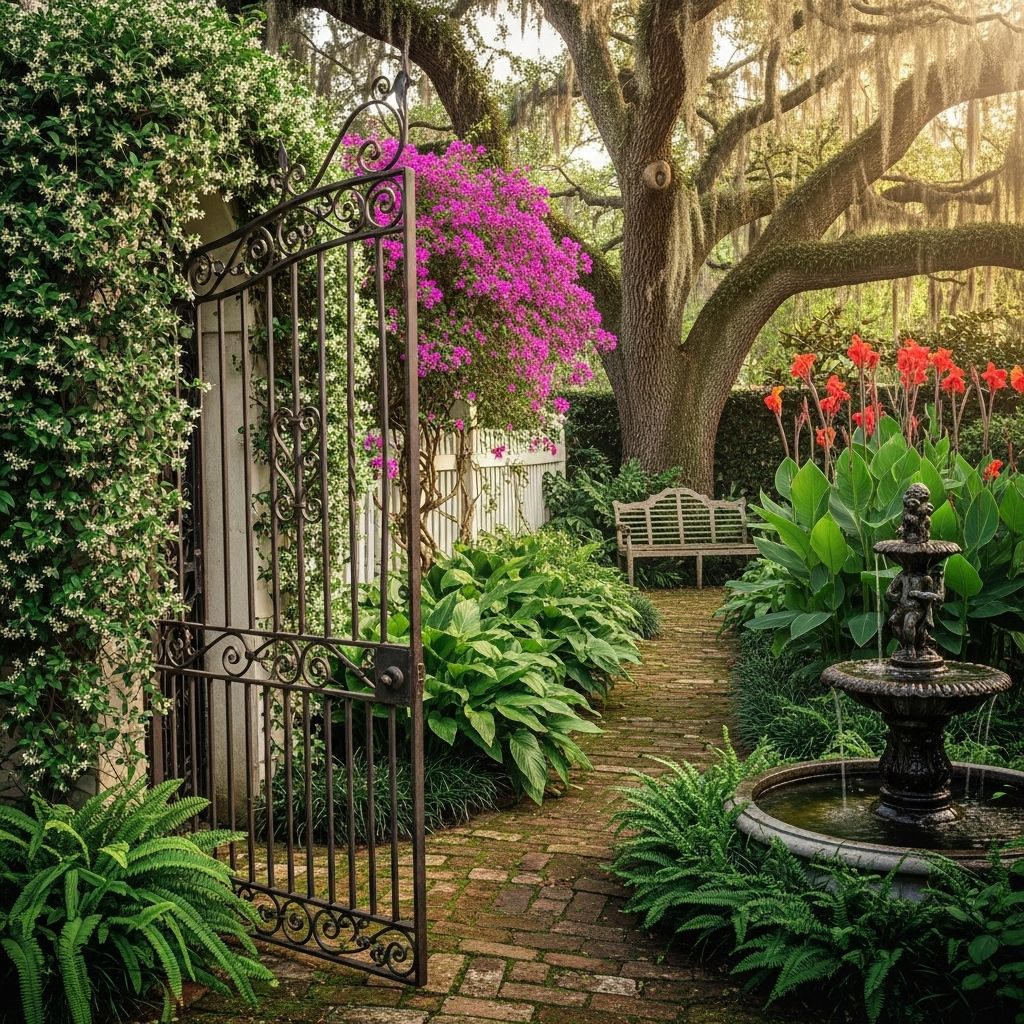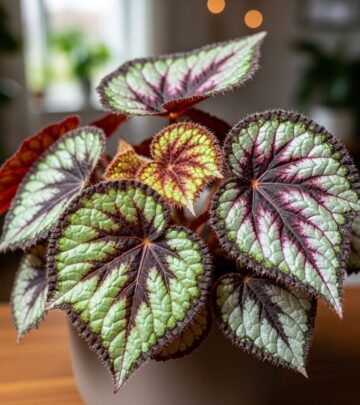10 Timeless Garden Ideas to Steal from New Orleans
Transform any corner into a romantic retreat with lush vines and ornate details.

Image: HearthJunction Design Team
New Orleans’ gardens are in a league of their own—lush, romantic, and brimming with the spirit of the city’s rich cultural and architectural history. The sultry subtropical climate, distinctive French Quarter landscapes, and storied traditions merge to create urban oases unlike any found elsewhere. Whether you dream of transforming a small patio or creating an atmospheric backyard retreat, here are ten garden ideas inspired by the Crescent City’s most iconic outdoor spaces.
1. Fragrant Jessamine: The Signature Southern Vine
Star
jasmine
—often referred to locally as jessamine (Trachelospermum jasminoides)—is almost synonymous with New Orleans gardens. With its heady scent and delicate white flowers, it’s a favorite for covering walls, fences, trellises, and arbors. Also popular is Asiatic jasmine (T. asiaticum), a hardy evergreen ground cover that’s both attractive and low-maintenance.- Training Vines: Let jessamine climb free on wrought iron or wood structures for a classic Southern look.
- Ground Cover: Use Asiatic jasmine where you need lush, fast-spreading greenery with minimal attention.
- Fragrance Factor: Position fragrant vines near seating or entryways to maximize enjoyment.
2. Draping Greenery: Let Vines Go Wild
Thanks to New Orleans’ humid warmth, vines thrive and often take on a life of their own. Garden designers recommend embracing this natural exuberance. Instead of constant pruning, allow plants to drape and soften boundaries, creating a sense of hidden romance and lushness.
- Use rambling plants like confederate jasmine, wisteria, and even bougainvillea for vertical interest.
- Permit vines to cascade over fences and arbors instead of restricting them to tight shapes.
- Allow for a mix of textures as different species interweave, increasing both biodiversity and beauty.
3. Ferns in Cracks: Celebrate Shady Coolness
In the warm, damp microclimates of New Orleans,
ferns
thrive in unexpected places—between bricks, along stair edges, and in mossy wall crevices. This accidental softness is a hallmark of the city’s gardens.- Plant native or hardy fern species between bricks or pavers in shady, cool spots.
- Mist with water regularly to mimic New Orleans humidity, encouraging natural spread.
- Let ferns creep into neglected corners; their presence brings a lived-in magic to any outdoor space.
4. Courtyard Gardens: Intimate Urban Retreats
The French Quarter’s enchanting courtyards—often tucked between historic walls—are legendary. Designed for both beauty and privacy, they make the most of limited city space with clever use of levels, lush planting, and classic water elements.
- Raised Beds: Construct raised planters to increase usable growing space and add a sense of abundance.
- Central Fountains: Use a water feature as a focal point, cooling the air and muffling city noise.
- Brick or Stone Surfaces: Ground your courtyard with traditional materials for authenticity and charm.
5. Filigree Fences: Ornamental Security
Ironwork in New Orleans is not just functional, but an essential art form. Both
wrought iron
and intricatecast iron
fences, gates, and railings adorn front gardens, providing both security and unmatched ornamental appeal.- Choose classic patterns inspired by Italianate architecture (floral, scroll, or even corn stalk motifs).
- Use iron railings as supports for vines like jessamine or wisteria—combining structure and softness.
- Consider modern custom cast iron for detailed reproduction or creative personalization.
The evolution of New Orleans ironwork:
| Era | Material | Design Characteristics |
|---|---|---|
| Early 1800s | Wrought Iron | Hand-forged, linear, classic motifs |
| 1840–1900 | Cast Iron | Highly decorative, floral, and symbolic patterns |
| Modern | Custom Ironwork | Replicas, contemporary motifs, mixed materials |
6. Dramatic Canopy Trees: Shade with Grandeur
Stately oaks, magnolias, and crepe myrtles often define a New Orleans garden, creating dappled shade and lending elegance and scale. Towering canopy trees both cool the city’s sultry air and frame plantings below.
- Plant live oaks or magnolias to establish legacy shade for generations.
- Use underplantings like hydrangeas, azaleas, or ferns to capitalize on cool, sheltered conditions.
- Hang Spanish moss or outdoor lanterns from limbs for instant atmosphere.
7. Abundant Container Gardens: Flexible Color Bursts
Where ground space is truly limited, as in small city plots or patios, container gardens thrive in New Orleans. Pots and urns overflow with tropicals, annuals, herbs, and citrus—adding layered interest and fragrance.
- Mix terra cotta, glazed, or wrought iron planters for textural variety.
- Seasonally rotate plants such as gardenias, rosemary, lemons, or petunias for year-round color.
- Cluster containers near seating areas, entrances, or fountains to make gathering spots even more inviting.
8. Painted Shutters & Doors: Bold Architectural Accents
New Orleans homes and gardens alike are renowned for their expressive palettes. Painted shutters, garden gates, and doors frequently display deep greens, indigo blues, or festive pinks, contrasting with lush plantings and pale stucco walls.
- Choose classic hues inspired by Creole cottages or period townhouses.
- Use color strategically to highlight features, define outdoor rooms, or reflect light in shaded courtyards.
- Complement bold paint choices with plantings in harmonizing or contrasting tones for maximum impact.
9. Parterre Patterns: Formal Lines amid Wildness
Borrowed from European and Caribbean influences, the parterre—a symmetrical garden bed divided by walkways or hedges—brings refined structure to New Orleans landscapes. Even in relaxed gardens, a hint of formality grounds the lushness.
- Design low boxwood or myrtle hedges in geometric layouts to define spaces.
- Use gravel or brick paths for classic separation, infusing order amid free-growing plants.
- Plant herbs, annuals, or blooming perennials within parterre compartments for dynamic color changes.
10. Citrus and Tropical Fruit: Edible Luxury
No New Orleans garden is complete without the scent and color of citrus trees. Oranges, lemons, limes, and kumquats—often grown in both the ground and large pots—provide beauty, shade, and edible bounty.
- Select dwarf fruit trees for containers or smaller urban plots; feature standard-sized trees in larger gardens.
- Companion plant with pollinator-attracting flowers (marigolds, nasturtiums) to boost fruit set.
- Harvest and use your own citrus in seasonal cuisine and cocktails for genuine local flair.
Frequently Asked Questions (FAQs)
What vine varieties are best for New Orleans-inspired gardens?
Star jasmine (Trachelospermum jasminoides), Asiatic jasmine, wisteria, and Confederate jasmine flourish in New Orleans’ climate, offering lush foliage and abundant blooms.
How do I maintain ornate ironwork in humid areas?
Regular cleaning, annual inspection, and touch-up painting protect iron railings and gates from rust. Opt for powder-coated finishes for improved durability in moist environments.
Can I grow citrus fruit in containers in cooler climates?
Yes. Dwarf citrus trees can thrive in large pots and can be overwintered indoors in bright, sunny spaces to protect them from frost.
What makes New Orleans courtyard gardens unique?
Intimate scale, lush plantings, water features, raised beds, and authenticity in materials (such as brick and stone) create the city’s signature courtyard aesthetic.
What’s the best way to encourage ferns to grow between pavers?
Choose shade-tolerant species, plant starts or spores in damp cracks, and mist regularly. The more humid and shaded the spot, the better the ferns will thrive.
Design Takeaways for Any Climate
- Even if you don’t live in a subtropical zone, many New Orleans garden ideas—intimate courtyards, parterre beds, dramatic color, and functional artistry—translate beautifully to other locales.
- Select plants adapted to your region while emulating the city’s layered, abundant style.
- Use elements like decorative ironwork, painted shutters, and strategic container plantings for instant Southern charisma.
Cherish the spirit of New Orleans by blending history, artistry, and exuberance into a garden that invites relaxation and celebration all year long.
References
- https://www.gardenista.com/posts/10-garden-ideas-steal-new-orleans/
- https://www.gardenista.com/posts/10-ideas-steal-desert-gardens/
- https://www.pinterest.com/pin/10-garden-ideas-to-steal-from-new-orleans-gardenista–53128470588747369/
- https://www.gardenista.com/submission/2018/jungly-new-orleans-backyard-remodel/
- https://www.pinterest.com/pin/10-garden-ideas-to-steal-from-new-orleans–7318418138525583/
Read full bio of Shinta












